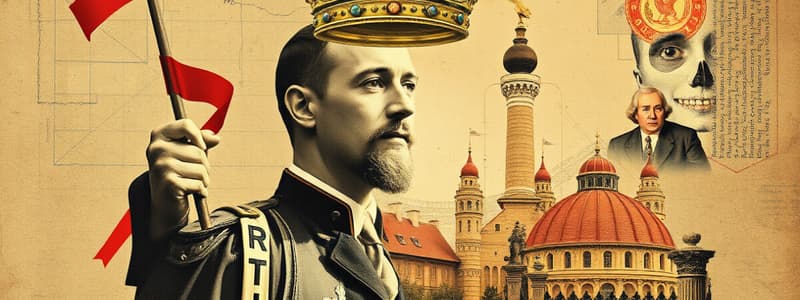Podcast
Questions and Answers
What is another name for Enlightened Despotism?
What is another name for Enlightened Despotism?
- Enlightened Autocracy
- Enlightened Absolutism (correct)
- Enlightened Liberalism
- Enlightened Democracy
What inspired Enlightened Despotism?
What inspired Enlightened Despotism?
The Enlightenment
Which of the following was NOT a reform associated with Enlightened Despots?
Which of the following was NOT a reform associated with Enlightened Despots?
- Increased access to education
- Reduction of torture and the death penalty
- Religious toleration
- Censorship of all literature (correct)
Who is known as Frederick the Great?
Who is known as Frederick the Great?
What was one of Frederick II's main reforms?
What was one of Frederick II's main reforms?
Catherine II was supportive of many reforms during her reign.
Catherine II was supportive of many reforms during her reign.
What notable religious policy did Joseph II implement?
What notable religious policy did Joseph II implement?
Match the following rulers with their notable actions or characteristics:
Match the following rulers with their notable actions or characteristics:
Flashcards are hidden until you start studying
Study Notes
Enlightened Despotism
- Also referred to as enlightened absolutism, represents a form of absolute monarchy influenced by Enlightenment ideals.
- Enlightened monarchs prioritized reason and rationality, embracing principles of the Enlightenment in governance.
- Key characteristics include fostering education, permitting religious tolerance, ensuring freedom of speech, and protecting private property rights.
- Philosophes played a critical role by inspiring and supporting the reforms implemented by these monarchs.
Enlightened Despot Reforms
- Major reforms included promoting religious toleration to create a more inclusive society.
- Streamlining legal codes for greater efficiency in law and governance.
- Enhancing access to education to improve literacy and intellectual growth among the populace.
- Reducing or abolishing practices such as torture and the death penalty, aiming for a more humane legal system.
Frederick II (Frederick the Great)
- Known as Frederick the Great, he was the ruler of Prussia and significantly impacted European politics through his Enlightenment beliefs.
- Son of Frederick William I, received extensive military education shaping his leadership style.
- Viewed himself as "the first servant of the state," focusing on state development through reforms post-war.
- His reforms primarily sought to enhance the state's power while addressing societal issues.
Frederick's Reforms
- Implemented religious toleration (with limitations for Jewish subjects).
- Actively promoted education, reforming schools and universities.
- Codified laws to simplify and streamline the legal system.
- Freed serfs on crown lands in 1763, contributing to socio-economic changes.
- Improved the efficiency of the bureaucratic system by introducing examinations for civil servants.
- Reduced censorship, promoting intellectual freedom.
- Abolished capital punishment, with exceptions for military courts.
Catherine II (Catherine the Great)
- As an Empress of Russia, she was considered one of the least "enlightened" among the enlightened despots.
- Required support from the nobility, which resulted in granting them considerable power over serfs, limiting reform benefits for the lower classes.
- Focused on educational improvements, including backing a private printing press to spread knowledge.
Joseph II
- The Emperor of Austria, recognized as the most radical yet least effective enlightened despot.
- Advocated for a highly progressive religious tolerance policy, allowing private worship for Jews.
- Actively challenged the authority of local nobles and aimed to reduce their influence.
- Notable for abolishing serfdom and extending more rights to peasants, enhancing their social standing.
- Many reforms were subsequently reversed by his successors, limiting their long-term impact.
Studying That Suits You
Use AI to generate personalized quizzes and flashcards to suit your learning preferences.




